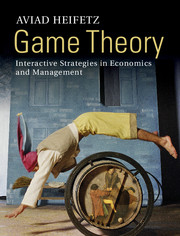Book contents
- Frontmatter
- Contents
- Foreword
- Part I Strategic interactions as games
- Part II Basic solution concepts for strategic form games
- Part III Prominent classes of strategic form games
- Part IV Uncertainty and mixed strategies
- Part V Advanced topics in strategic form games
- Part VI Dynamic games
- 18 Extensive form games
- 19 Non-credible threats, subgame perfect equilibrium and backward induction
- 20 Commitment
- 21 Backward induction
- 22 Moves of nature
- Part VII Repeated games
- Index
- References
21 - Backward induction
limitations and difficulties
from Part VI - Dynamic games
Published online by Cambridge University Press: 05 August 2012
- Frontmatter
- Contents
- Foreword
- Part I Strategic interactions as games
- Part II Basic solution concepts for strategic form games
- Part III Prominent classes of strategic form games
- Part IV Uncertainty and mixed strategies
- Part V Advanced topics in strategic form games
- Part VI Dynamic games
- 18 Extensive form games
- 19 Non-credible threats, subgame perfect equilibrium and backward induction
- 20 Commitment
- 21 Backward induction
- 22 Moves of nature
- Part VII Repeated games
- Index
- References
Summary
In Chapter 19, we demonstrated how to find perfect equilibrium by backward induction in games with a finite number of nodes, in which a unique player plays at each node. We saw how this solution concept excludes Nash equilibria that rely on non-credible threats. In Chapter 20, we saw how strategic behavior that embodies commitment can be reflected in subgame perfect equilibria found by backward induction.
At the same time, even when backward induction leads us to find a unique subgame perfect equilibrium, there are instances in which this equilibrium is not consistent with players’ actual real-life behavior, nor with our intuition concerning “reasonable” or “foreseeable” behavior of players in the strategic situation at hand. In this chapter, we will present two key examples illustrating the limitations of this solution concept: the “ultimatum game” and the “centipede game.” We will analyze the reasons for the limitations that these games illustrate.
The ultimatum game
This is a very simply structured two-player game. Player 1 gets an amount X of money. She must offer part of it, Y, to player 2. If player 2 accepts the offer, the transaction takes place: player 1 gets the payoff X – Y and player 2 gets the payoff Y. If, however, player 2 refuses the offer, both players get the payoff 0.
Information
- Type
- Chapter
- Information
- Game TheoryInteractive Strategies in Economics and Management, pp. 353 - 365Publisher: Cambridge University PressPrint publication year: 2012
References
Accessibility standard: Unknown
Why this information is here
This section outlines the accessibility features of this content - including support for screen readers, full keyboard navigation and high-contrast display options. This may not be relevant for you.Accessibility Information
- 1
- Cited by
